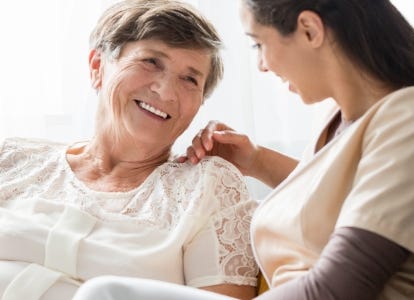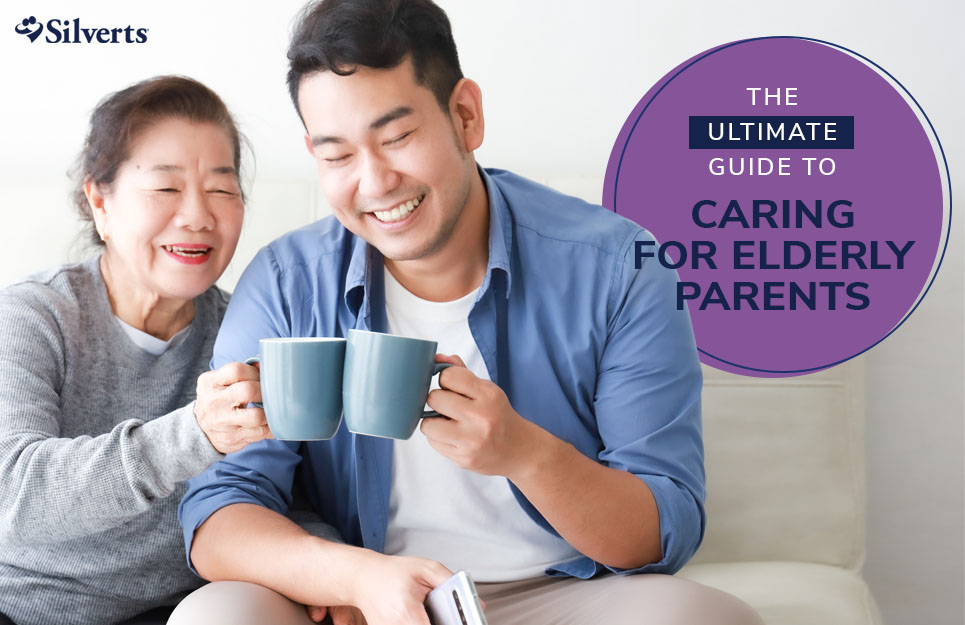The Ultimate Guide to Caring for Elderly Parents
Wondering how to care for your aging parents or other elderly loved ones? It’s a big decision, and one that requires a lot of thought. In this ultimate guide, we walk you through everything you need to know to assess your elderly loved one’s needs and decide on the best care situation for them.
Caring for Elderly Parents: Daily Activities
Activities of daily living (abbreviated as ADLs) are the essentials that people need to be able to do in order to keep living on their own. These activities include showering and bathing, getting dressed and using the restroom. It also includes self-hygiene activities such as brushing your teeth, shaving, styling your hair and other grooming activities.
This is the most fundamental category of activities, and usually older adults will struggle with more complex activities, such as paying bills or cooking meals, before they begin to struggle with basic daily tasks like showering. Most people who struggle with ADLs need some kind of full-time help, either from a loved one or a trained professional caregiver.
However, it’s important to note that many older adults can continue to perform daily activities if proper adjustments are made to their lifestyle and living space. Our environments are not designed for older adults, which can make it extremely hard for them to take care of themselves as their mobility becomes more limited. For example, utensils with wide rubber grips can make eating feasible once more, and adaptive clothing makes it possible for older adults to continue to dress themselves even if they have arthritis in their hands.
If you notice your elderly parent struggling with these activities, sit down with them or observe them to determine which tasks are giving them the most trouble. Then, do some research to see if there are any devices that have been designed to help older adults cope with the same things your loved one is struggling with. While it does take some digging to find these rather niche products, you might be surprised to discover what solutions are out there for arthritis, diabetes and more. Just a few simple upgrades can help your loved one continue to live independently or partially on their own for a good while yet.
Caring for Elderly Parents: Instrumental Activities
Instrumental activities of daily living (IADL) are not necessary for daily living but are needed for long-term care. Examples of instrumental activities include cooking meals, keeping the home clean, paying bills, running errands and more. These more complex activities require higher cognitive function and the ability to think ahead and coordinate multiple pieces at once.

Usually, older adults will begin struggling with instrumental activities before they begin struggling with daily activities, so keep an eye on your loved ones for changes in this area in particular and what they might mean. A sudden switch to frozen meals might indicate that your loved one is no longer able to grocery shop and prepare meals as they once did. While a little forgetfulness is normal as someone ages, look for widespread patterns that indicate your loved one might not be able to completely manage their affairs alone anymore.
Older adults who struggle with instrumental activities might only need part-time help, depending on what tasks they struggle with and how often. For instance, it might be enough to have a home aide come in two to three days a week to prepare meals, clean up the home and take care of other tasks. This sort of arrangement can allow your loved one to comfortably age in place for years to come.
In particular, you’ll want to pay attention to bills and other financial concerns, as missing an important bill could result in important services such as electricity, gas and cell phone service being cut off. You may wish to help your loved one set up automatic payments, or possibly have yourself added as a joint account holder so you can keep an eye on their bills. While your loved one might not want to have this conversation now, it’s much better to settle everything and create a backup plan while they are able to manage their own finances. It can take a whole lot of stress off both of you later on down the line.
Shop Adaptive Clothing for Seniors
Caring for Elderly Parents: Medical Activities
We wanted to specifically call out medical activities, as many older adults have at least one chronic health condition they are managing, whether that is diabetes, arthritis, Alzheimer’s, heart disease or a host of other conditions. These conditions often require multiple treatment strategies, not only lifestyle changes such as diet and exercise but also medical interventions such as medications, injections, physical therapies and more. If your loved one is struggling to manage their health, that’s also a sign that they probably need outside help.

What kind of outside help they need depends on their abilities as well as the severity levels of their conditions. For instance, if they just need occasional reminders to take their own medications, you or a health aide can do that for them. However, if they need help administering injections, setting up oxygen tanks and dealing with higher level medical tasks, that will probably require hiring a registered nurse or another medical professional with more training. If the assistance is medically necessary, your loved one’s insurance might help cover it, so definitely check on that first before making a decision.
If your loved one is having a medical procedure, such as surgery, you might also want to consider hiring some professional help temporarily to speed up the healing process and help ease the burden of care on both you and your loved one. Even if it’s only for a few days or weeks, having a professional who can check the surgical sites, give them bed baths, change their hospital gown, etc. can really make a huge difference. If you are feeling overwhelmed in trying to help your loved one recover, then consider calling in some medical assistance on a temporary basis. (Shop for post-surgical recovery wear here.)
Caring for Elderly Parents: Living Options
There are many different elder care options for your loved one. Which one you choose will depend on their needs, your capabilities to offer care and also the state of your finances. While we’ve already put together a more in-depth guide on elder care options, we’ll highlight the main ones here. Then, we’ll walk you through how to choose between them in the next section.

The first option is having your loved one age in place at a private residence, either their current home or a new one. This option is best suited to those who are still able to cope well with both daily activities and instrumental activities on their own. They will still need a family member to check on them daily, just in case, but they are mostly able to go about their business on their own. You can also hire a home aide to come into their residence a couple of times a week and help them out with instrumental activities.
The second option is moving them into your house or another family member’s home. Obviously, you will need the space to accommodate them, or renovate your home to expand it. This decision can make financial sense for families whose elderly loved one needs more hands-on help and who also have extra space (for instance, they have a free bedroom after an older child permanently moves out). You can either provide the care yourself, or hire a home aide to do it for you.
The third option is moving your loved one into a dedicated community or care facility. These offer different options of support depending on how much care your loved one needs. An independent living community is the most hands-off, while a skilled nursing facility provides around the clock care for those with more advanced medical issues. If your loved one needs something in the middle, then try looking at assisted living facilities.
Choosing How to Care for Elderly Parents
Obviously, you have a lot of options when it comes to caring for your elderly loved one as they age. So how do you choose which one to pursue? Here are four factors you should weigh as you make your decision:

Their Abilities
As you can tell from the first half of this article, the primary driving factor in how you care for your elderly parent is their abilities and needs. Do they struggle with daily activities? Can they dress and feed themselves, but need help with running errands and paying bills? Do they have a major medical condition they need help managing? Would they be okay with a few hours of help two to three days a week, or do they need around the clock care? Assess your loved one’s status and ask yourself these questions to make sure you’re making the best decision for them.
Your Abilities
Many people assume that moving their parents in with them will be the easiest, cheapest option. However, before committing to become a full-time caretaker, it’s important to assess what demands you currently have on your time as well as your own abilities. If you’re super forgetful, then it’s not a great idea to make yourself responsible for giving your loved one daily medication that helps keep them alive. If you’re currently working a full-time job, or caring for children as well, then you might not have the time to devote to taking care of your loved one. In these situations, it might make more sense to hire outside help or relocate them to a care facility.
Living Environment
You also need to assess both your loved one’s living situation as well as your own. If they are independent enough to age in place, is their house safe for them or does it present potential hazards? Can you renovate or otherwise mitigate the hazards, or would it make more sense to move them into a new home altogether? If you want them to move in with you, do you have the room now or will you need to build an addition? How much will that cost? If you want to move them into a care facility, is it close enough that you can visit regularly? In all cases, will they be close enough to doctors that they can get help quickly if a health crisis arises? Really thinking through all possible scenarios will ensure that you make the best decision possible.

Finances
No one enjoys talking about finances, but money will play a major role in how you choose to care for your elderly loved one. Examine their finances and determine how much savings and income they have left. Also, investigate your own situation and determine how much money (if at all) you can afford to contribute to taking care of them. If they have a medical condition, consult their insurance to see what kind of care it might possibly pay for and how much the policy will contribute. In some cases, the finances might make the decision for you, while in others, you might realize that you have more options than you thought.
Whether your elderly parent needs diabetic footwear or adaptive clothing, we’ve got it at Silverts! We offer a wide range of clothing and accessories designed specifically for elderly loved ones. Order more than $20 and get free shipping on your U.S. order!
Image Credits
shutting/Shutterstock.com
Ruslan Huzau/Shutterstock.com
SeventyFour/Shutterstock.com
Evgeny Atamanenko/Shutterstock.com
StudioByTheSea/Shutterstock.com
Monkey Business Images/Shutterstock.com
Image Point Fr/Shutterstock.com





No Comments